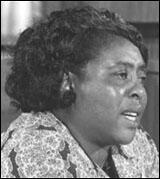Fannie Lou Hamer

Fannie Lou Hamer, the youngest of twenty children, was born in Montgomery County, Mississippi, on 6th October, 1936. A sharecropper, Hamer did not know that African Americans could vote until she attended a a Student Nonviolent Coordinating Committee (SNCC) meeting at a church in Ruleville. When Hamer attempted to register to vote, she was arrested and jailed. The next day her landlord told her that if she did not withdraw her request to vote, she would be forced off her land. Hamer responded by becoming an active member of the SNCC.
After losing her work on the plantation, Hamer was employed as a field secretary of the SNCC and in 1963 she was instrumental in establishing the Delta Ministry, an extensive community development program. During the Freedom Summer campaign she helped form the Mississippi Freedom Democratic Party. Hamer became a national figure when at the Democratic Party national convention she made a passionate speech challenging the seating of the regular all-white Mississippi delegation.
In 1968 Hamer founded the Freedom Farms Corporation (FFC) a non-profit venture designed to help poor farming families. It also provided social services and grants for education. Fannie Lou Hamer died in Mound Bayou, Mississippi on 14th March 1977.
Primary Sources
(1) Fannie Lou Hamer, To Praise Our Bridges (1967)
My life has been almost like my mother's was, because I married a man who sharecropped. We didn't have it easy and the only way we could ever make it through the winter was because Pap had a little juke joint and we made liquor. That was the only way we made it. I married in 1944 and stayed on the plantation until 1962 when I went down to the courthouse in Indianola to register to vote. That happened because I went to a mass meeting one night.
Until then I'd never heard of no mass meeting and I didn't know that a Negro could register and vote. Bob Moses, Reggie Robinson, Jim Bevel and James Forman were some of the SNCC workers who ran that meeting. When they asked for those to raise their hands who'd go down to the courthouse the next day, I raised mine. Had it up as high as I could get it. I guess if I'd had any sense I'd a-been a little scared, but what was the point of being scared? The only thing they could do to me was kill me and it seemed like they'd been trying to do that a little bit at a time ever since I could remember.
Well, there was eighteen of us who went down to the courthouse that day and all of us were arrested. Police said the bus was painted the wrong color - said it was too yellow. After I got bailed out I went back to the plantation where Pap and I had lived for eighteen years. My oldest girl met me and told me that Mr. Marlow, the plantation owner, was mad and raising sand. He had heard that I had tried to register. That night he called on us and said, "We're not going to have this in Mississippi and you will have to withdraw. I am looking for your answer, yea or nay?" I just looked. He said, "I will give you until tomorrow morning. And if you don't withdraw you will have to leave. If you do go withdraw, it's only how I feel, you might still have to leave." So I left that same night. Pap had to stay on till work on the plantation was through. Ten days later they fired into Mrs. Tucker's house where I was staying. They also shot two girls at Mr. Sissel's.
I've worked on voter registration here ever since I went to that first mass meeting. In 1964 we registered 63,000 black people from Mississippi into the Freedom Democratic Party. We formed our own party because the whites wouldn't even let us register. We decided to challenge the white Mississippi Democratic Party at the National Convention. We followed all the laws that the white people themselves made. We tried to attend the precinct meetings and they locked the doors on us or moved the meetings and that's against the laws they made for their ownselves. So we were the ones that held the real precinct meetings. At all these meetings across the state we elected our representatives to go to the National Democratic Convention in Atlantic City. But we learned the hard way that even though we had all the law and all the righteousness on our side - that white man is not going to give up his power to us.

